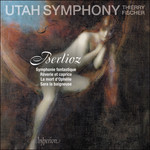|
Back
03/21/2020
Hector Berlioz: Symphonie fantastique, opus 14 – Rêverie et caprice, opus 8 [1] – La Mort d’Ophélie, opus 18, n° 2 [2] – Sara la baigneuse, opus 11 [3]
Philippe Quint (violin) [1], Utah Symphony Chorus [2, 3], University of Utah Chamber Choir [2, 3], Utah Symphony, Thierry Fischer (conductor)
Recording: Abravenal Hall, Salt Lake City, Utah (February 2019) – 80’33
Hyperion CDA68324 (Distributed by PIAS) – Booklet in English, French and German

   
With Thierry Fischer’s recent milestone capturing the United States’ first orchestral recording of Camille Saint-Saëns’ Symphonies, the Utah Symphony now turns to another French fascination in this all-Berlioz CD. Even though the programme is anchored by the masterful Symphonie fantastique, it’s the remaining seldom-performed œuvres [the remaining three] that will pique the listeners’ interest. These three attractive scores burgeon in borderless delectability and ultimate finesse. The enticement glistens, and within these exercises is where Thierry Fischer ardently shines.
Depending upon one’s druthers, Symphonie fantastique’s parlance is a skosh sloggy with intermittent pockets of vibrancy. Deliberative and pontificating, “Rêveries – Passions” gives clear indication of Thierry Fischer’s desire to “quarantine” strong conservations in the dynamics department. Onto “Un bal”...M. Fischer holds a firm spell upon the lyres. Though strings retrench in portamento, the double harps spin about with prickly runs that continue to build firm pronouncement. “Scène aux champs'” echoed English horn/oboe rendezvous contrasts are slight. Orchestral integration, albeit permeable, tow in lightness. Furthermore, “Marche au supplice” doesn’t congeal substantive, ominous pooling, thus a thickening agent whirls away upon the horns in an abundance of benevolence. Cast as a shocker, Berlioz’s blade’s been blunted.
Julliard-trained Philippe Quint holds top billing as the limelight centers around the transcription of Teresa’s scuttled aria from Benvenuto Cellini. Darting to the forefront, this piece has been christened a virtuosic solo in which the violinist handles the lyrical lines with great ease. Purely conversational, it is like lilacs blossoming in springtime despite erratic outbursts of hesitancy, committing to a higher level of order. Gnawing away in faintly citrusy peels, M. Quint lightly teases the narrative with persuasive locution. Potted along the way by whiffs of whipped flippancy, the closing bars directly parallel that of “Un bal" in a clever statement. This piece is striking.
Floating down from the heavens, Hector Berlioz’s immortal tribute to Harriet Smithson, La Mort d’Ophélie, is a deeply introspective memorial. Back dropped by sopranos and altos, the dreaminess from earlier Rêverie et caprice bleeds into a delicate exposition with beau teint. Infinite in quality, choral members never lose grip of Shakespeare’s words. We now witness Hector Berlioz bathed in stronger sensitivity and amorous introspection. This music is cradled upon a white–fleeced wing. Superlative!
Filigreed by sfumato Jean-Jacques Henner’s 1903 painting points to Mona Lisa-like ambiguity, appropriately pointing to Hyperion's cover that acts as the fitting portal in paraphrasing the ballade for three choruses and orchestra. We now land upon one of Berlioz's richest inventions. Thierry Fischer’s consortium points Sara la baigneuse to a lacy meandering, as if to say we're hearing paper petals unfurling in the wind. Femininity and grace, there is, and suddenly Victor Hugo’s poem comes alive with compassion and coy sensuality.
Those intrigued by Hector Berlioz and his illustrative music will be encouraged to visit this CD. Housing three works, as previously noted, Hyperion’s release is worth its weight in gold.
Christie Grimstad
|